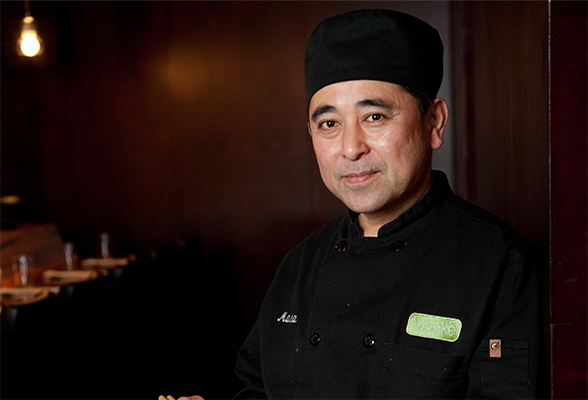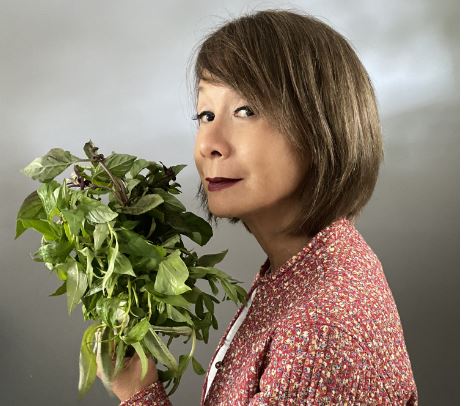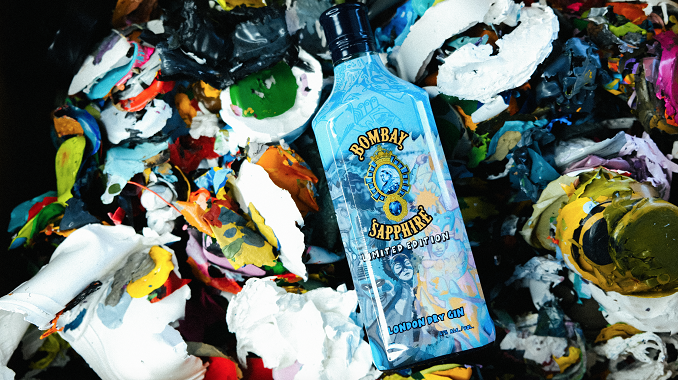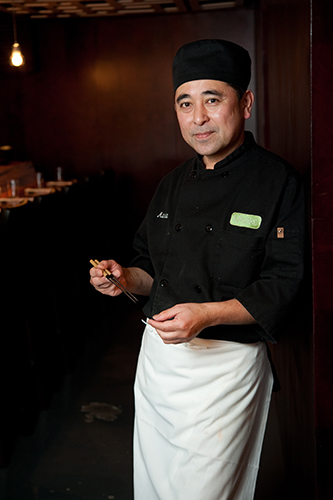 Take a look at a map of the United States. Now think of authentic, and sometimes downright strange, Japanese fare prepared by a world-renowned chef. You might identify New York, Los Angeles, Chicago or Boston as likely places to find this type of cuisine. But it is in Maine, where the sun rises first in America, where an unlikely demographic can order dishes from the land of the rising sun.
Take a look at a map of the United States. Now think of authentic, and sometimes downright strange, Japanese fare prepared by a world-renowned chef. You might identify New York, Los Angeles, Chicago or Boston as likely places to find this type of cuisine. But it is in Maine, where the sun rises first in America, where an unlikely demographic can order dishes from the land of the rising sun.
Co-owner and Chef Masa Miyake, along with his partner William Garfield, challenge the oldest, least diverse (read: whitest) population in the country to dine with adventure at their three restaurants in Portland, Maine: Miyake, Pai Men Miyake, and Miyake Diner. And the challenge is unequivocally accepted by locals and tourists alike. They have perfected the art of transforming the timidly curious into the courageously loyal by meeting diners where they are and at the same time introducing them to new concepts.
“When we first opened Miyake in 2007, we greeted our customers by offering them what they’d expect to see at a traditional Japanese restaurant,” stated Garfield. “Gradually, Chef Miyake would pair a more unique piece with an old favorite. We’d increase their comfort level while decreasing their inhibitions.” Soon, customers knew to expect the unexpected from Chef Miyake.
Self-reliance and Maine go hand in hand. Eating locally sourced products is not a fad there; it’s a key selling point when diners are deciding where to enjoy a meal. Though he prides himself on sourcing the best products from around the world, Chef Miyake’s true passion and priority is following a farm-to-table model whenever possible. On Miyake Farm in the town of Freeport — a mere 15 miles away from Portland — Chef Miyake raises and breeds a wide variety of livestock to supply his restaurants with the freshest products possible. Plans are afoot to include a structure to grow herbs and vegetables during even the harshest of Maine winters. “For my customers and Mainers in general, locally produced food is respected as a sign of authenticity. Folks will come on board more readily if they know you are authentic,” said Chef Miyake. Garfield agreed, “We can offer more exotic dishes but at the same time put minds at ease by using our own ingredients.”
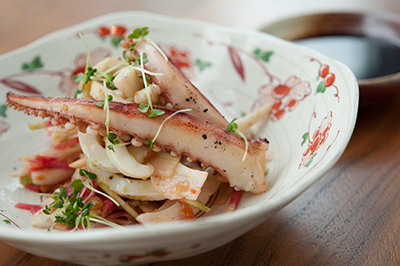
The Miyake family of restaurants offers unapologetically authentic Japanese cuisine in environs that transport traditional meat and potatoes diners from Maine to the countryside of Japan — all without shaking their standard Maine sensibility. But it was not always that way. When Miyake moved from their original location to an area in Portland with a number of upscale and established restaurants, they were faced with a crisis of conscience. In order to compete, Chef Miyake and Garfield began to add items to their menu like steak, crab cakes, and other more mainstream dishes. “Those were dark days,” said Chef Miyake, only half-joking. “We decided we needed to compete and lost our direction. The clientele shifted and I was not able to approach our menu with the same level of creativity.” It was not long before Chef Miyake reworked the menu once again to reflect the successful formula of helping customers feel “comfortably adventurous” as Garfield puts it.
Each of the three Miyake locations offers distinct dishes and dining styles that are varying degrees of unique. From convincing hesitant Mainers that ramen noodles are not just for cash-strapped college students at the Pai Men Miyake location, to introducing the Japanese izakaya tradition at Miyake Diner — Chef Miyake is committed to epicurean discovery.
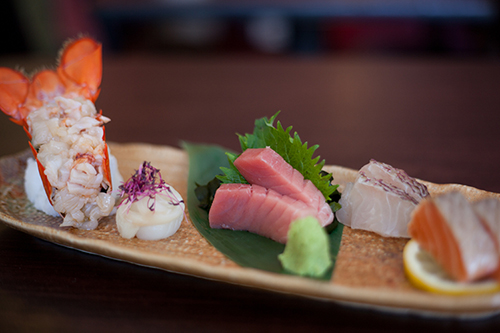
“In essence, the success we had at Miyake has allowed us to continuously push the envelope at Pai Men and now Miyake Diner. Miyake Diner will be a Japanese gastro pub — serving a collection of small plates similar to Spanish tapas-style dining. “We built a reputation of trust, which allowed customers to let down their guard a bit and try something new,” said Garfield.
And the team at Miyake isn’t finished challenging its clientele. “Nihonshu is the next frontier,” Garfield said with a smile. Known as sake to most, Miyake’s newest restaurant will introduce visitors to a wide variety of sake, which will serve to enhance the dining experience. While the concept of pairing beverages with meals is not new, Chef Miyake’s use of sake as an important part of his culinary offerings will also broaden customers’ knowledge of the traditional Japanese beverage.
Acknowledging Maine’s penchant for picking the winner of presidential elections, there’s a saying that “As Maine goes, so goes the nation.” In this case, as Miyake goes, so goes Maine.



